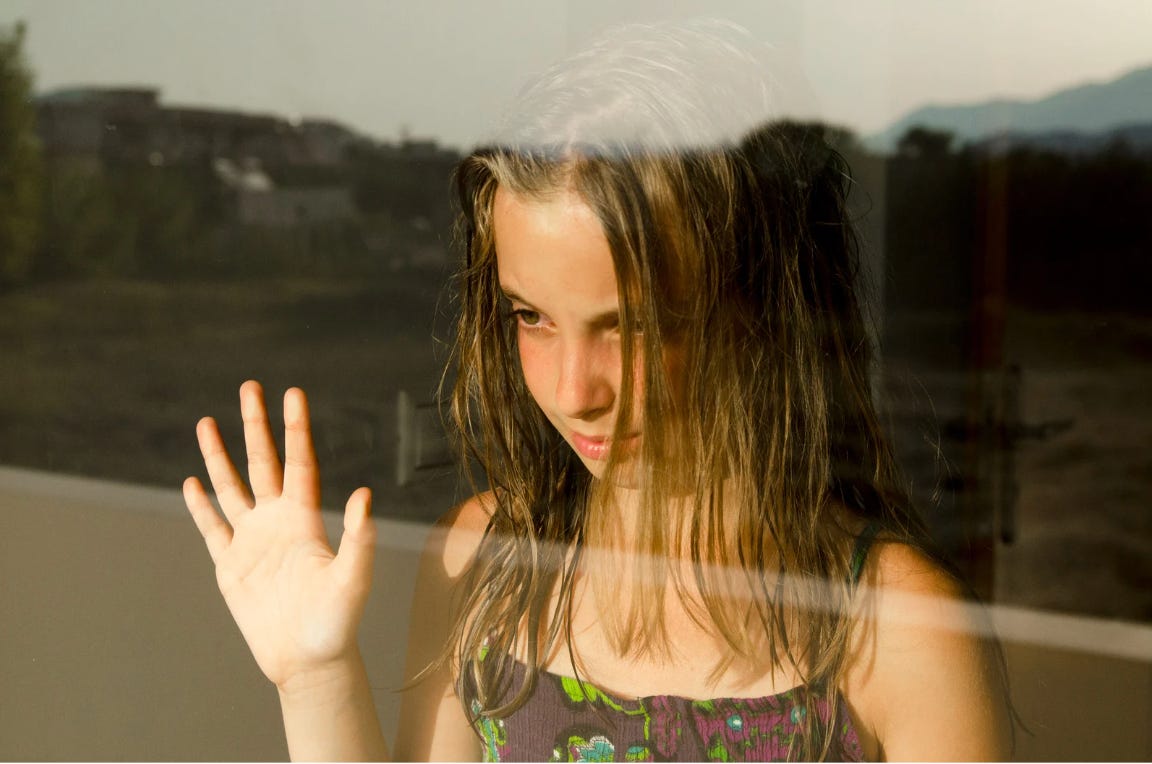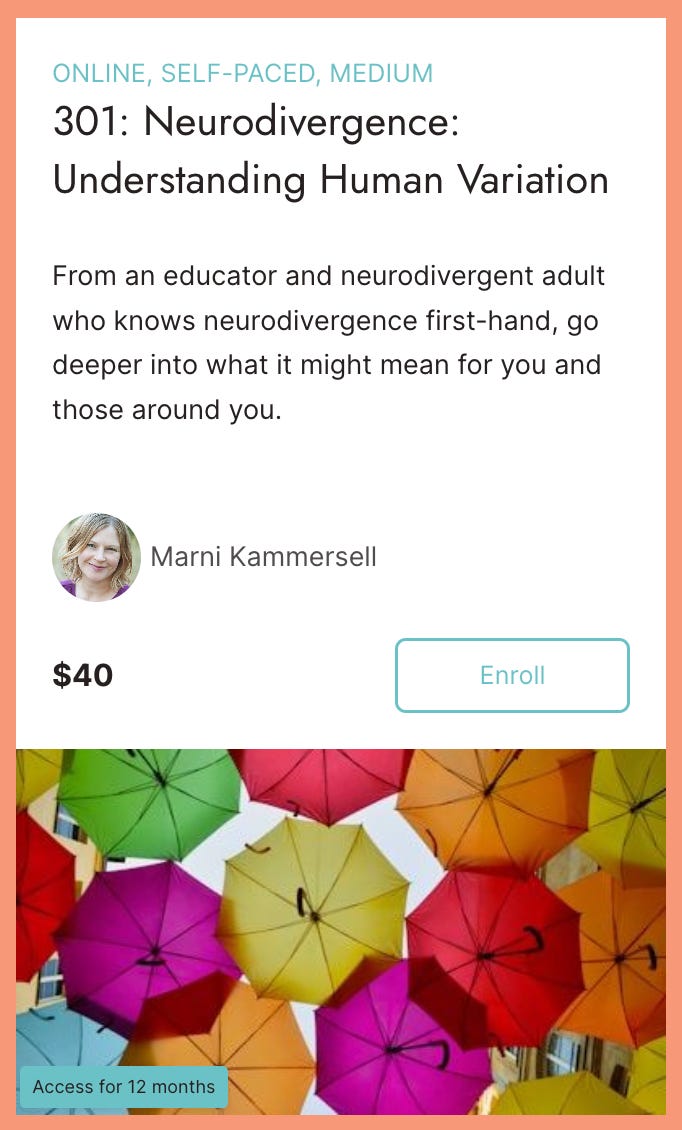Discovering Neurodivergence in Community
What it looks like when exploring differences is not about "you," but rather "us"
Hello, and if you’re new here, welcome! I wasn’t able to make as much time for writing here on Substack last month as I would have liked, because I was busy with several exciting things. The Low Demand Parenting Summit was one. I completed my first mini-course on Understanding Neurodivergence (which is now available for purchase on demand) and I recorded a podcast episode with Fran Liberatore! Check out the end of this newsletter for more details.
What if the message was not “You’re broken,” but instead “You’re one of us.” That was my experience of discovering neurodivergence in the context of community.
Like so many late-identified adults, it was pandemic stress that brought me to an understanding of neurodivergence. In the spring of 2020, I became fixated on NPR's pandemic coverage, often finding myself in tears over the kitchen sink. Intrusive thoughts began to surface, and for the first time, I considered the possibility of mental illness in relation to myself. My knowledge of neurodivergence was nonexistent, and my interactions with the mental health system were minimal. For better or worse, my only encounter with therapy of any kind had been a brief two-session stint after a challenging romantic relationship in college.
These experiences didn’t directly lead me to neurodivergence. I saw them in the context of a global trauma and they seemed like appropriate reactions to an unfathomably difficult time. But they opened my mind a bit to the possibility that many of the things psychiatry calls “disorders” might in fact be very understandable responses to one’s environment. They laid a foundation for my later mindshift and integrating the Neurodiversity Paradigm into my worldview.
Like some other Autistic people, there were things about the acute pandemic phase that I enjoyed - like spending most of our time at home and experiencing a lot less demands than our usual busy homeschooling life. My children were young enough to still play together and enjoy simple pleasures. We focused on cozy connection, backyard time, and a slower pace of life (I also wrestled a lot with the privilege that allowed that to be our experience).
A year and a half later, Summer 2021, we were cautiously seeing a few longtime friends again. These were the families my older children grew up with, our closest homeschooling companions. For six years the kids had been a tight-knit bunch, seeing each other multiple times each week including long days of free range play. I knew them and their parents well.
As we came back together in person after extended periods of isolating (during which we kept in touch via zoom, but of course that wasn’t the same), my friends and I shared stories and noticed similar patterns. Our children were showing a variety of stress behaviors that they never had before.
One of these young people, my best friend's daughter, always struck me as remarkably similar to my childhood self. She was an avid reader who preferred the company of a few close friends and had strong opinions on nearly everything. I found her delightful. Pandemic isolation was hard on her and one day my friend shared that they were pursuing an evaluation, because she was pretty sure that they were both Autistic. My initial response was uncertainty - like most adults, the only thing I knew about Autistic people at that time were outdated stereotypes. However, within minutes of my friend explaining what she had discovered, I found myself responding, “Well, if you’re Autistic, then I am too!” And then I had an “oh wait… no, really…” kind of moment.
That night (after several hours of hyper-focused exploration), I tearfully confided in my husband that I was Autistic and had never known. I wasn’t totally sure, but I was sure enough. This revelation kicked off a deep dive into the very confusing world of neurodivergence that has continued to this day. It took me two months to feel confident in this new understanding of myself, and then two more years to be ready to be openly Autistic. It’s quite a head trip to sort through all of the misinformation out there and to willingly take on such a marginalized identity, perhaps especially as someone who was identified as gifted.
Yet, for me, this exploration was conducted while enveloped in supportive community and this made all the difference. It seemed like everyone I loved was exploring a neurodivergent identity, often for both themselves and their kids. Several of my best friends were particularly helpful, as we delved into research together and exchanged insights. In light of that shared experience, it was easier for me to stay rooted in the knowledge that we were all going to be okay (even the smaller, more feral folks among us who were still developing their prefrontal cortex).
We had made it all the way to adulthood with so little understanding of ourselves and our neurotypes, and we’d all still managed to create adult lives that we loved. Surely, despite their inevitable challenges, our young people would also find their way – especially with the support of adults who could share our own relevant experiences!
Sadly, this experience of coming to an understanding of one’s own neurodivergence as “I’m one of many awesome neurodivergent humans” is not common. Most ND people, and especially kids, are identified as neurodivergent based on perceived deficits. They’re considered too loud, too jumpy, too intense, too shy, too emotional, or just too much. They don’t fit in to their environment and the problem is identified as being located within them. It makes such a huge difference when neurodivergence is recognized from the inside and explored through an identity lens, rather than as something placed on someone from the outside as a “label.”
What are your thoughts on all of this? Have you also discovered neurodivergence in community, or was it a more isolating experience? I’d love to hear from you in the comments!
- Marni
I had the pleasure of recording a podcast episode with the lovely
of . We talked about the Neurodiversity Paradigm, understanding some basic terms around neurodiversity, and a bunch of other things. I do hope you’ll check it out!In addition, my first mini-course is available: Neurodivergence: Understanding Human Variation! I partnered up with my friends at Tandem Learning to bring this into the world. It’s a beginner’s guide to understanding neurodiversity and neurodivergence, for people who are curious and just getting started.






Marni congrats for your course! I’m constantly inspired by your knowledge and the experiences you share xx
For me, it has been a lot easier slowly recognizing that I'm autistic as a middle-aged adult. There are so many of us out there, especially women without a formal diagnosis. So many Facebook groups, so little time!
Both of my sons were identified as gifted in the primary grades, and as autistic in fourth grade. They don't fit the old stereotypes, either. It was hard on my oldest to get a diagnosis at a time when no one could really tell him (or me) what it meant. People had commented on how bright he was since he was two months old. Now, the therapist was telling me - in front of him - that he was going to struggle through life and never be able to do this or that. Schools didn't know what to do with him and decided he was being defiant on purpose, not having actual anxiety or learning difficulty. Unfortunately, 15 years later, I am still hearing these stories from other parents.